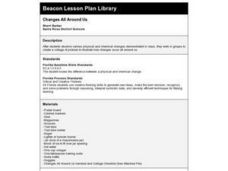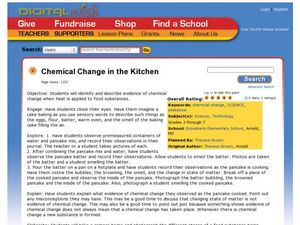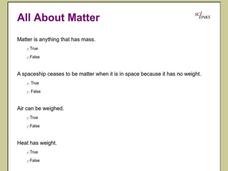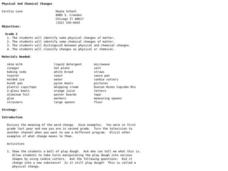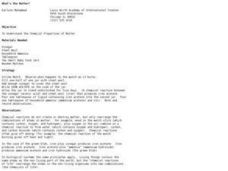Curated OER
The Nature of Chemical Change: Acting Out an Example
Students identify the signs that a chemical reaction took place. In this chemistry lesson, students role play the movement of different molecules of matter. They classify matter according to their properties.
Curated OER
Physical and Chemical Change of Six White Substances
Students investigate chemical and physical changes in reactions. In this chemical and physical change lesson plan, students mix 6 different white substances with water, vinegar and iodine. They make hypotheses about each substance and...
Curated OER
Chemical Changes
Fourth graders examine and identify chemical and physical changes in a variety of substances. They observe a vinegar and baking soda demonstration, and a water, laundry detergent, and Epsom salt mixture demonstration. They discuss the...
Mr. E. Science
Chemical Reactions
Once I told a chemistry joke, but there was no reaction. Get young chemists involved in changes and reactions with a presentation that begins with physical and chemical changes and chemical reactions. It moves on to chemical equations...
Curated OER
Properties of Matter
A collection of ten slides reveals bright graphics and photos. Though the title is "Properties of Matter," the content is incoherent. You will find a couple of slides on chemical reactions, a few on the example of the S.S. Hindenburg...
Curated OER
Physical and Chemical Changes in Matter
Students investigate chemical and physical changes. In this chemical and physical changes lesson plan, students distinguish between a chemical and physical change when observing baking bread and hot dogs and bagels cooking on a grill....
Curated OER
Changes All Around Us
Sixth graders, in groups, observe the difference between physical and chemical changes and create a collage of pictures to show the difference.
Curated OER
Chemical Change in the Kitchen
Students examine chemical changes to food. For this chemical changes lesson, students make foods and observe the changes. The changes are recorded in an observation journal. Students photograph food they make at different stages in the...
Department for Children, Schools and Families
Explaining Change Processes Using a Simple Particle Model of Matter
The more things change, the more they stay the same. This unit includes seven lessons starting with physical change and moving through to chemical change. Conservation of matter is explained clearly with multiple hands-on activities and...
Curated OER
Physical and Chemical Changes
Students examine the different changes in matter. In this chemical change lesson students determine the amount of reactant made in a reaction using the law of conservation.
Curated OER
Physical and Chemical Properties of Matter
Students identify the physical and chemical properties of matter. They review the types of matter. Students list the four states of matter (Solid, Liquid, Gas and Plasma). They recognize and describe the different types of matter.
NASA
The Cycle of Matter
An educational lesson focuses on the idea of conservation of matter through a demonstration of the water cycle, a discussion of digesting food, and the path of carbon and oxygen atoms as they change form.
Curated OER
Changes in Matter
Eighth graders, in groups, explain the difference between physical and chemical changes.
Curated OER
Chemical Changes
Eighth graders observe two types of interactions in a sealed plastic bag. One bag contains baking soda and water, and the other baking soda and vinegar. They determine what evidence indicates that a chemical change is occurring.
Curated OER
Recognizing and Describing Chemical Changes
Seventh graders distinguish between physical and chemical changes in both natural and technological settings. They identify the reactants and products for a given chemical reaction. they then write simple chemical equations given the...
Curated OER
All About Matter
Twenty-four questions about matter, the states of matter and the properties of matter make up this interactive online worksheet. Your class will determine the volume of water, the shape of water and the shapes of matter.
Virginia Department of Education
Thermochemistry: Heat and Chemical Changes
What makes particles attract? Here, learners engage in multiple activities that fully describe colligative properties and allow the ability to critically assess the importance of these properties in daily life. Young chemists conduct...
Curated OER
Physical And Chemical Changes
Second graders identify physical and chemical changes of matter. They distinguish between physical and chemical changes. They classify changes as physical or chemical.
Curated OER
Atomic Theory
An extremely thorough presentation walks new chemists through the basics of matter. There really isn't a unifying theme, however So many topics are covered: forces, elements, atomic structure, chemical properties, compounds, quarks,...
Herff Jones Education
Chemical Energy
Provide the class with a quick lesson on chemical energy as they are assisted in creating hot and cold packs to demonstrate energy transfer between objects. They observe the energy change in matter as it transforms and distinguish...
Integrated Physics and Chemistry
Law of Conservation of Matter
Does mass change during a chemical reaction? Demonstrate the Law of Conservation of Matter while encouraging class members to be creative with a two-part lesson. First, learners use Alka-Seltzer® tablets and water to demonstrate the...
Mr. E. Science
An Introduction to Matter
What's the matter? Gas, solid, liquid, or plasma. The presentation covers how to describe and identify matter, changes in matter, types of matter, measuring matter, particles of matter, Democritus, and John Dalton's Atomic Theory.
Curated OER
The Nature of Chemical Change: Acting Out An Example
Young scholars illustrate the molecular nature of matter and show that chemical change involves alteration of molecules.
Curated OER
What's the Matter? (Living and Non-Living Things)
Understand how chemical reactions recombine atoms to create the "chemicals of life". An experiment, showing the basic chemical reactions of an iron nail or a match, helps young children start their understanding of permanent changes.








